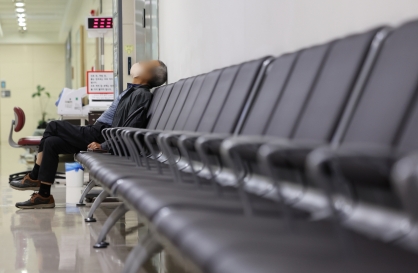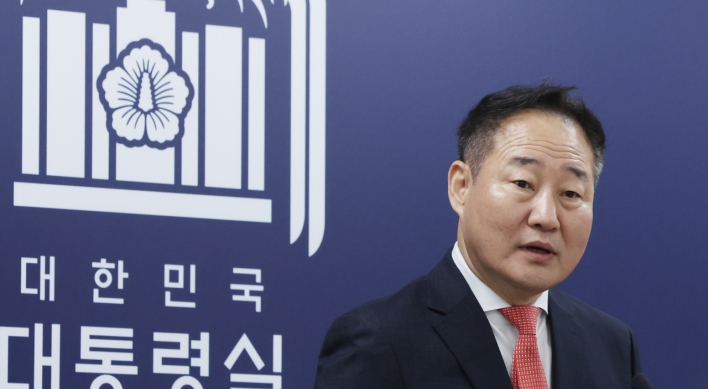Internal unity and national consensus should be greatly emphasized in the Republic of Korea which, as one half of a divided nation, confronts a most bellicose adversary across a volatile border.
But South Korea is torn apart by too many social and political conflicts in which extremist attitudes defy reasonable solution. Elections escalate the differences, with parties making the incorrect assumption that only criticism can help them collect more votes.
The central administration, local autonomous bodies and even the military ― in the case of the current hot issue of naval base construction on Jeju Island ― do not seem to know how to use the state authority properly to settle prolonged conflicts. Holding sway at the scenes of disputes is the alliance of leftist political groups and progressive civic activists who have powerful support from the liberal media and the technology-savvy younger populace.
At Gangjeong Village on the southern coast of Korea’s largest island of Jeju, land and sea battles are under way between police and obstructers of the naval base project as Navy contractors carry out the initial work of blasting rocks and sinking tetrapods to build breakwaters. The Navy is determined to press on with the construction to finish it by 2015, one year behind the original schedule.
If the naval base site is the scene of the worst clashes, the nation is rocked by other conflicts of no less magnitude. Political parties have been wrestling over the scope of welfare programs by competing to offer more benefits to the underprivileged as the election approaches.
The nation is split over whether or how to amend the supposedly disadvantageous Korea-U.S. free trade agreement and whether or not an FTA with China is necessary. Both of these are issues with great political and economic ramifications.
Having watched the earthquake and tsunami in northeastern Japan, the nation is faced with the grave choice between increasing its dependence on nuclear power and phasing it out. Leftist civic groups and opposition parties are also mounting campaigns against the second stage of the four-river projects to revamp the tributaries to the main waterways. The Saenuri Party’s new international airport plan causes an inter-provincial dispute in the southeastern region over its proposed location.
On the higher plane are the problems of the widening gap between the rich and the poor, the “subjugation” of small businesses by conglomerates and the indiscretions of the super-rich, a major cause of the rise of leftism. Tensions fatigue in relations with North Korea is prompting calls for Seoul to ease its stance toward Pyongyang, but this is vehemently opposed by those who cannot forgive the attacks in the West Sea in 2010.
One conflict is extended to another and political and social groups only exacerbate disputes rather than acting toward accommodation and compromise. For years, we witnessed no instance in the National Assembly chamber of one group accepting the other’s seemingly reasonable assertion before they move to a vote, often through violent physical clashes.
The Republic of Korea cannot go on like this for ever. Some are worried that the foundation of democracy is being threatened and the clock could turn back to days that we hate to recall. We should establish a social agreement and every politically and socially active element should pledge to abide by it. The number one article should be that parties and civic groups are not allowed to interfere directly with the problems in specific enterprises or localities while they may express their views only through socially acceptable channels.
Central and local governments should respect administrative actions taken by their predecessors. The present president, mayor or city council has no right to reverse what had been done under legitimate mandate in the preceding term. And whenever an administrative measure is implemented, government offices should do so through sufficient prior research, public debate and persuasion ― and most importantly, never simply to boost popularity.
The right priorities should be firmly observed in any government project. National security should be weighed first, to be followed by considerations of economic effect and impact on social justice. There will always be problems involving individual rights and collective interests, but if politicians, administrators and social activists keep acting on the above principles, conflicts can be overcome, in Gangjeong Village or elsewhere.
But South Korea is torn apart by too many social and political conflicts in which extremist attitudes defy reasonable solution. Elections escalate the differences, with parties making the incorrect assumption that only criticism can help them collect more votes.
The central administration, local autonomous bodies and even the military ― in the case of the current hot issue of naval base construction on Jeju Island ― do not seem to know how to use the state authority properly to settle prolonged conflicts. Holding sway at the scenes of disputes is the alliance of leftist political groups and progressive civic activists who have powerful support from the liberal media and the technology-savvy younger populace.
At Gangjeong Village on the southern coast of Korea’s largest island of Jeju, land and sea battles are under way between police and obstructers of the naval base project as Navy contractors carry out the initial work of blasting rocks and sinking tetrapods to build breakwaters. The Navy is determined to press on with the construction to finish it by 2015, one year behind the original schedule.
If the naval base site is the scene of the worst clashes, the nation is rocked by other conflicts of no less magnitude. Political parties have been wrestling over the scope of welfare programs by competing to offer more benefits to the underprivileged as the election approaches.
The nation is split over whether or how to amend the supposedly disadvantageous Korea-U.S. free trade agreement and whether or not an FTA with China is necessary. Both of these are issues with great political and economic ramifications.
Having watched the earthquake and tsunami in northeastern Japan, the nation is faced with the grave choice between increasing its dependence on nuclear power and phasing it out. Leftist civic groups and opposition parties are also mounting campaigns against the second stage of the four-river projects to revamp the tributaries to the main waterways. The Saenuri Party’s new international airport plan causes an inter-provincial dispute in the southeastern region over its proposed location.
On the higher plane are the problems of the widening gap between the rich and the poor, the “subjugation” of small businesses by conglomerates and the indiscretions of the super-rich, a major cause of the rise of leftism. Tensions fatigue in relations with North Korea is prompting calls for Seoul to ease its stance toward Pyongyang, but this is vehemently opposed by those who cannot forgive the attacks in the West Sea in 2010.
One conflict is extended to another and political and social groups only exacerbate disputes rather than acting toward accommodation and compromise. For years, we witnessed no instance in the National Assembly chamber of one group accepting the other’s seemingly reasonable assertion before they move to a vote, often through violent physical clashes.
The Republic of Korea cannot go on like this for ever. Some are worried that the foundation of democracy is being threatened and the clock could turn back to days that we hate to recall. We should establish a social agreement and every politically and socially active element should pledge to abide by it. The number one article should be that parties and civic groups are not allowed to interfere directly with the problems in specific enterprises or localities while they may express their views only through socially acceptable channels.
Central and local governments should respect administrative actions taken by their predecessors. The present president, mayor or city council has no right to reverse what had been done under legitimate mandate in the preceding term. And whenever an administrative measure is implemented, government offices should do so through sufficient prior research, public debate and persuasion ― and most importantly, never simply to boost popularity.
The right priorities should be firmly observed in any government project. National security should be weighed first, to be followed by considerations of economic effect and impact on social justice. There will always be problems involving individual rights and collective interests, but if politicians, administrators and social activists keep acting on the above principles, conflicts can be overcome, in Gangjeong Village or elsewhere.






![[K-pop’s dilemma] Time, profit pressures work against originality](http://res.heraldm.com/phpwas/restmb_idxmake.php?idx=644&simg=/content/image/2024/05/08/20240508050705_0.jpg&u=20240508171126)
![[K-pop’s dilemma] Can K-pop break free from ‘fandom’ model?](http://res.heraldm.com/phpwas/restmb_idxmake.php?idx=644&simg=/content/image/2024/05/09/20240509050541_0.jpg&u=20240509173751)










